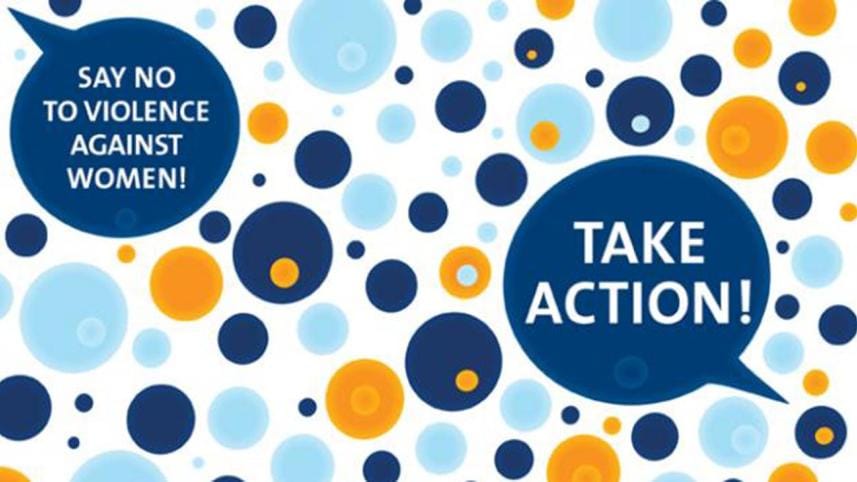9 women envoys urge prevention of gender-based violence

Nine women ambassadors based in Bangladesh have written an op-ed on '16 Days of Activism Against Gender-Based Violence Campaign'. Below is the full text:
As women ambassadors representing nine nations, there are certainly a wide range of issues on which we focus. Yet we all vigorously agree on this: the urgent need to prevent and respond to gender-based violence in Bangladesh, in our own countries, and across the globe.
Studies show that gender-based violence (GBV) is disturbingly pervasive. Worldwide, the World Health Organization estimates that one of every three women will experience physical and/or sexual violence by a partner during her lifetime. Here in Bangladesh, findings from the Report on Violence Against Women (VAW) Survey 2011 published by the Bangladesh Bureau of Statistics indicate that as many as 87 percent of married women have ever experienced any type of violence by their husbands.
We can do something to stop it.
Gender-based violence threatens entire communities, precludes economic growth, and fuels cycles of violence and conflict. A recent World Bank study showed that violence against women has significant economic costs. These include health-care costs, lost income for women, decreased productivity, and negative impact across generations.
According to UN Women, violence against women causes more death and disability for women and girls between the ages of 15 and 44 than do cancer, traffic accidents, malaria and war combined.
Gender-based violence comes in many forms, from intimate partner violence to sexual assault to early and forced marriage. Each form of violence is a stain on our collective humanity, a barrier to peace and stability, and a call to action for all of us. Violence is not inevitable – and each of us can do something to stop it.
The 16 Days of Activism Against Gender-Based Violence is an opportunity for everyone to act. Every November 25, the International Day of Elimination of Violence Against Women kicks off the 16 Days, which ends on Human Rights Day on December 10. Launched by the United Nations, the campaign demands action from everyone – men and women, boys and girls, government officials and community leaders. Around the world and across Bangladesh, people are taking action to raise awareness and promote social norms that refuse to tolerate GBV, prerequisites for preventing this scourge.
At a global level, the nations we represent – Bhutan, Brazil, Denmark, France, Malaysia, the Netherlands, Norway, Sri Lanka, and the United States – are working with the United Nations to end gender-based violence with the new 2030 Sustainable Development Agenda, which emphasizes gender equality and the empowerment of women and girls as a cross-cutting issue that we must address if we are to achieve any of our development goals. Now we must turn our attention to implementation. Partnership with other governments, private sector, and especially civil society will be critical to these efforts.
We can each take action in our own lives to end gender-based violence. Support survivors by listening to them and believing in them. Educate men and boys to support women and girls and stand up to violence.
At home and abroad, our governments support projects to raise awareness of gender-based violence, educate policymakers on this issue to increase legislative support, train service providers to better address the needs of survivors, and increase justice and accountability. We fund projects that provide safe spaces and vocational training for survivors, and work to mobilize religious, business owners, and community leaders to end different forms of gender-based violence.
We engage in these efforts because there is another issue on which we all agree: that only through collective action will violence against women and girls be eliminated once and for all.
Signed by:
Her Excellency Ms. Pema Choden
Ambassador
Royal Bhutanese Embassy
Her Excellency Ms. Wanja Campos da Nóbrega
Ambassador
Embassy of Brazil
Her Excellency Ms. Hanne Fugl Eskjær
Ambassador
Embassy of Denmark
Her Excellency Ms. Sophie Aubert
Ambassador
Embassy of the Republic of France
Her Excellency Madame Norlin binti Othman
High Commissioner
High Commission of Malaysia
Her Excellency Ms. Leoni Margaretha Cuelenaere
Ambassador
Embassy of the Kingdom of the Netherlands
Her Excellency Ms. Merete Lundemo
Ambassador
Royal Norwegian Embassy
Her Excellency Ms. Yasoja Gunasekera
High Commissioner
Sri Lankan High Commission
Her Excellency Ms. Marcia Bernicat
Ambassador
Embassy of the United States



 For all latest news, follow The Daily Star's Google News channel.
For all latest news, follow The Daily Star's Google News channel.
Comments